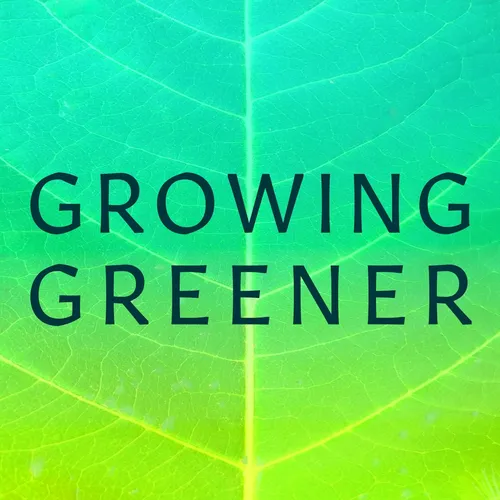
Growing Greener
Your weekly half-hour program about environmentally informed gardening. Each week we bring you a different expert, a leading voice on gardening in partnership with Nature. Our goal is to make your landscape healthier, more beautiful, more sustainable, and more fun.
- Update frequency
- every 7 days
- Average duration
- 29 minutes
- Episodes
- 318
- Years Active
- 2019 - 2025

One Family’s Definition of Regenerative Agriculture
When Carol Bouska and her siblings inherited the family farm in Iowa, they seized the opportunity to commit to restoring the soil, enhancing wildlife habitat, and bolstering the community in which th…

Knowing Your Soil - Part 2
Join pioneering nurseryman and ecologist Neil Diboll for the second half of our conversation about how gardeners can familiarize themselves with the natural characteristics of the soil on their site …

Knowing Your Soil
Traditional gardening emends the soil to suit the needs of the selected plants; pioneering nurseryman and ecologist Neil Diboll takes the character of the soil on site as the foundation of garden des…

A Dynamic Toolbox of Innovative Land Restoration Strategies
Internationally acclaimed landscape designer Edwina von Gal’s Perfect Earth Project uses imaginative strategies to connect landowners big and small with nature-based, chemical-free and biodiversity …

How Human Manipulation Affects the Relationship of Hydrangeas and Pollinators
Garden activist and educator Cathy Ludden describes her encounters with hydrangeas and how transforming the flower heads to suit human aesthetics has proved both harmful and beneficial to pollinator…

A Masterful Integration of Natives and Exotics
Richard Hayden, Senior Director of Horticulture at New York’s magical garden, the High Line, describes how it integrates North American native plants with carefully chosen exotic species to create a…

Giving a Neater, more Domesticated Look to the Native Plant Garden
Many homeowners who admire the beauty and environmental benefits of native plants don’t care for the wilderness look of the typical naturalized native plant garden. Garden designer Britney O’Donnell…

Will Nature Heal Itself?
Skeptics say that invasive species are not a serious threat to biodiversity, that “Nature will heal itself” despite the looming, man-made mass extinction. Today, paleobotanist Dana Royer describes t…

Blending Native and Non-Native Plants to Benefit Pollinators – and Gardeners
Karen Bussolini of historic nursery White Flower Farm makes the case for how a mix of native and non-native flowers can feed pollinators better throughout the growing season

Making Lawns Non-toxic and Environmental Contributors
Environmentalists say the traditional lawn must go, but homeowners commonly love their turf. Organic lawn specialist Shay Lunseth outlines how we can “meet in the middle,” and explains why fall is t…

Back to the Future
Amanda Douridas of the Ohio State University Extension Service describes cover cropping, an ancient practice that can move your vegetable garden toward healthier, richer soil with less dependence on …

A Natural Gardening Leader Speaks Out
In a conversation recorded in February, 2020, Benjamin Vogt discusses his pioneering book, A New Garden Ethic, and the need for gardeners to become activists in this era of existential challenges to …

Rethinking Lawns
Dr. Rebecca Barak describes the collaboration between the Chicago Botanic Garden, Chicago Park District, Northwestern University, and the University of Michigan–Flint to develop native, biodiverse la…

For Peat’s Sake
Alex Critchley and Sarah Johnson of The Wildlife Trust for Lancashire, Manchester & North Merseyside describe the growing movement in Britain to ban the sale of peat and peat-based gardening project…

A Founder of the American Conservation Movement Evolves to Address Contemporary Challenges
Established in 1875, American Forests is a non-profit that was an enormously influential pioneer in addressing the over-exploitation and destruction of our nation’s forestlands. Listen as Benita Hus…

The Coevolution Arms Race
Dr. Anurag Agrawal of Cornell University describes the many ways that plants defend themselves against locally indigenous insects, and how the insects defuse and even become dependent on the plants’ …

Progress in the Battle Against Emerald Ash Borers
Dr. Claire Rutledge of the Connecticut Agricultural Experiment Station describes the ingenious use of native and non-native insects to control the damage done by this introduced, tree-killing pest

Making Room for Bats
Bats play many positive, essential roles in the ecosystem, says Lee Mackenzie of Austin Bat Refuge – learn how to make your garden hospitable to these good and harmless neighbors

A Rich Source of Native Lawn and Groundcover Plants
Sam Hoadley, the manager of the trial garden at the Mt. Cuba Center in Hockessin, Delaware explores the native sedges of Genus Carex, a diverse, largely untapped source of groundcovers, foliage plant…

Carol Reese Explains Sex in the Garden
Distinguished horticultural educator Carol Reese shares a lively exploration of transexual plants and other reproductive mysteries displayed in your garden (originally broadcast in January 2022).